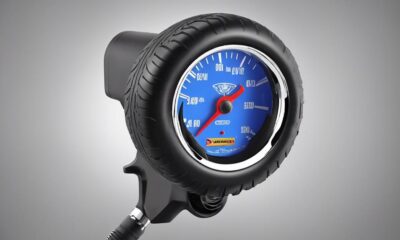Beginners Guides
Why Are Cruise Taxes So High Compared to Other Travel?
Unravel the mystery behind why cruise taxes outweigh those of other travel options, shedding light on the complex factors at play.
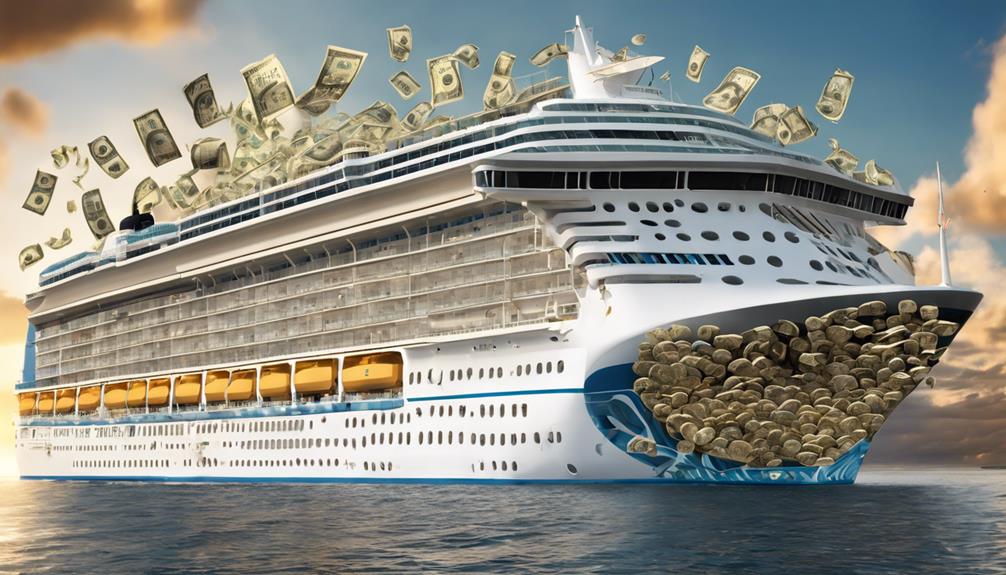
As we step onto the deck of a cruise ship, the vast expanse of the ocean stretching out before us, one might wonder why cruise taxes seem to loom larger than those for other forms of travel.
The intricate web of fees and charges that contribute to the overall tax burden on cruise travelers is a complex puzzle waiting to be unraveled. From government taxes to port charges and service fees, each element plays a part in the high costs associated with cruising.
Join us as we explore the underlying reasons behind these seemingly inflated cruise taxes and discover how they compare to other modes of travel.
Key Takeaways
- Cruise taxes encompass port charges, government fees, and security costs, leading to higher overall taxes.
- Taxes can reach 20% of the base fare, a significant portion compared to other travel modes.
- Port charges cover various services like docking tolls and baggage handling, adding to tax expenses.
- Strategic planning, off-peak bookings, and choosing lower-tax ports can help minimize cruise tax impact.
Factors Impacting Cruise Taxes
When analyzing the factors influencing cruise taxes, it becomes evident that government taxes, port charges, ship inspections, and security services play significant roles in determining the final fees passengers incur.
Government taxes are a mandatory component of cruise taxes, covering a range of services like customs clearance and environmental regulations. Port charges are fees levied by port authorities for the use of facilities and services, with costs varying depending on the size of the ship and the services required.
Ship inspections guarantee safety standards are met, contributing to the overall security of passengers and crew. Security services encompass a wide array of measures to safeguard passengers, leading to additional costs that are factored into the overall cruise taxes.
These fees cover essential aspects of the cruise experience, such as port docking, ensuring a smooth and secure journey for all passengers. The variation in fees reflects the diverse services and resources required at different ports of call, ultimately contributing to the total cost incurred by passengers.
Comparison With Other Travel Taxes
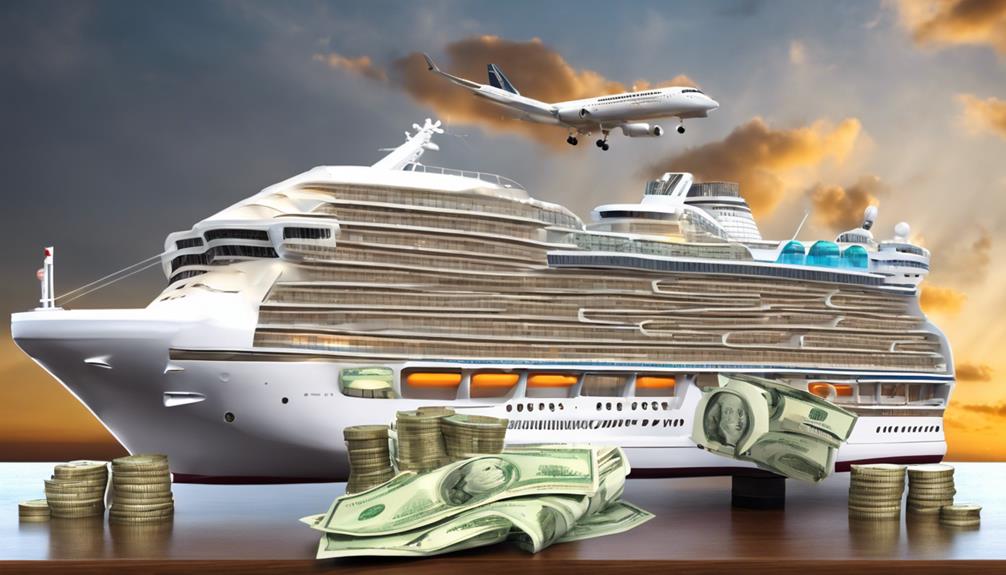
Comparatively, cruise taxes stand out as notably higher than taxes associated with other modes of travel due to the inclusion of additional port charges, government taxes, and security fees.
While fees per person for air travel typically encompass airport taxes and security charges, cruise taxes go beyond these to cover port fees, docking tolls, and other unique expenses related to maritime regulations.
The total cost of cruise taxes can amount to as much as 20% of the base fare, reflecting the substantial financial burden they impose on travelers.
Unlike other forms of travel where government taxes may be more transparent or included in the ticket price, cruise taxes often come as separate charges, adding to the perception of higher fees.
These taxes are distributed across all passengers to offset various expenses such as immigration costs, local harbor pilots, and IRS charges, making them a notable component of the overall cruise experience.
Understanding Port Charges and Taxes
Port charges and taxes on cruises represent mandatory expenses imposed by ports of call, which are then transferred to passengers, covering various operational costs such as docking tolls, security services, and baggage handling. These expenses can vary based on factors like the ship's size, the number of passengers, and the services required at each port. Below is a comparison table highlighting some typical port charges and taxes incurred during a cruise:
| Expense | Description | Impact |
|---|---|---|
| Docking Tolls | Fees for the ship to dock at the port | Direct cost |
| Harbour Pilot Payments | Charges for pilot services guiding the ship | Navigational support |
| Baggage Handling | Costs related to handling passengers' luggage | Passenger convenience |
Understanding these port charges is important for effectively managing cruise expenses and planning for additional costs. Taking these charges into account in your overall cruise budget to avoid surprises and guarantee a smooth sailing experience.
Strategies to Minimize Cruise Taxes
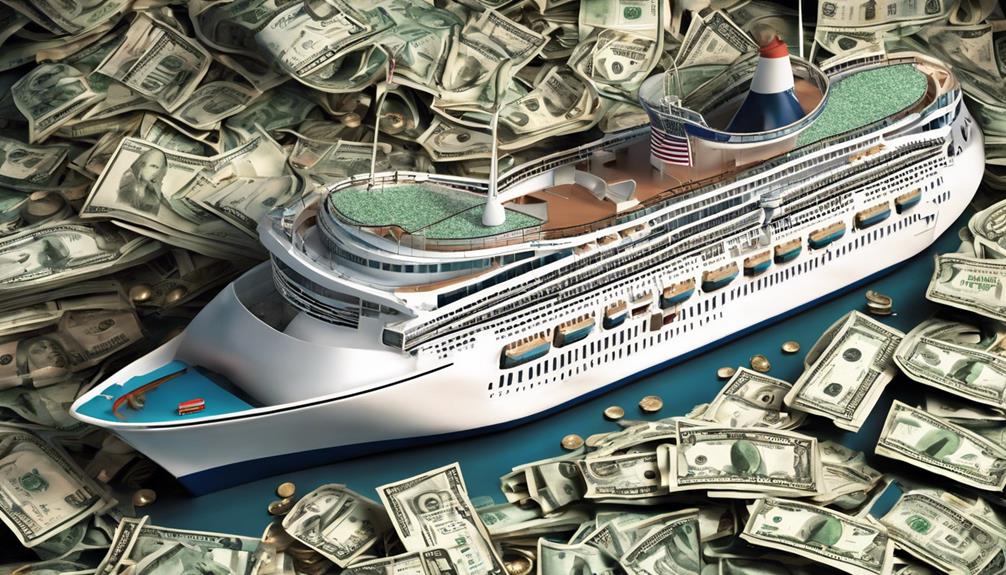
To effectively reduce the impact of high cruise taxes, travelers can employ strategic planning and targeted booking approaches. When aiming to minimize cruise taxes, consider the following strategies:
- Book during off-peak seasons: Research and book cruises during off-peak seasons to potentially lower overall costs, including taxes.
- Choose ports with lower tax rates: Consider booking cruises departing from ports with lower tax rates to reduce the impact of high cruise taxes.
- Look for promotions: Seek promotions or deals that may include discounted or waived taxes as part of the package.
- Opt for shorter itineraries: Select shorter cruise itineraries with fewer port visits to minimize the cumulative effect of high cruise taxes.
Future Outlook for Cruise Taxes
As we look ahead to the future of cruise taxes, the sustainability of current tax rates in the face of evolving industry trends and post-pandemic considerations comes into focus. Several factors will play a vital role in shaping the future outlook for cruise taxes.
| Factors | Impact on Future Cruise Taxes |
|---|---|
| Port Facilities | Ongoing maintenance costs may lead to sustained high taxes. |
| Health and Safety Protocols | Additional protocols post-pandemic could increase taxes. |
| Technological Advancements | Energy-efficient ships may impact taxes positively. |
| Government Regulations | Changes in regulations may influence future tax rates. |
Collaboration between cruise lines, port authorities, and regulatory bodies will be essential in finding innovative solutions to manage tax burdens effectively. Embracing environmental-friendly practices and meeting compliance standards can also contribute to potential tax reductions in the long term. It is imperative for the industry to adapt to these changes and work together towards a sustainable and economically viable future for cruise taxes.
Conclusion
To sum up, the high taxes on cruises compared to other travel options can be attributed to a combination of government fees, port charges, and various service expenses.
By understanding the breakdown of these costs and implementing strategies to minimize taxes, travelers can make informed decisions to save money.
Looking ahead, it will be important for cruise companies to find ways to balance the tax burden on passengers while maintaining the quality of service. Achieving this balance may involve exploring innovative pricing strategies or offering flexible packages that cater to a wide range of budgets. Additionally, emphasizing unique experiences, such as the best Alaska cruises for wildlife, can help attract travelers seeking value beyond just affordability. By prioritizing exceptional service and unforgettable adventures, cruise companies can foster customer loyalty even amid financial challenges.
- About the Author
- Latest Posts
Introducing Ron, the home decor aficionado at ByRetreat, whose passion for creating beautiful and inviting spaces is at the heart of his work. With his deep knowledge of home decor and his innate sense of style, Ron brings a wealth of expertise and a keen eye for detail to the ByRetreat team.
Ron’s love for home decor goes beyond aesthetics; he understands that our surroundings play a significant role in our overall well-being and productivity. With this in mind, Ron is dedicated to transforming remote workspaces into havens of comfort, functionality, and beauty.
Beginners Guides
Best Time to Cruise Alaska for Wildlife Enthusiasts
Fascinated by wildlife? Discover why July is the ultimate time to cruise Alaska for unforgettable wildlife encounters.

If you're a wildlife enthusiast planning an Alaska cruise, choosing the best time to go is like picking the ripest fruit from the tree. July, known as the prime month for wildlife viewing, offers a chance to witness nature's majestic spectacle in full swing.
But the question remains, what makes this time so special for wildlife enthusiasts? Stay tuned to uncover the secrets of Alaska's peak wildlife season and discover why July stands out as the prime time for wildlife sightings in this breathtaking region.
Key Takeaways
- Peak wildlife viewing in Alaska occurs from late July to early September.
- Bears are active near salmon-rich areas during this period.
- Humpback whales and killer whales are commonly spotted in Alaskan waters.
- Steller sea lions and bald eagles offer year-round wildlife sightings.
Optimal Months for Wildlife Viewing
When planning a cruise through Alaska for best wildlife viewing, it's important to think about the peak months of July through early September. During these months, bears are drawn to salmon-rich creeks and streams, offering a remarkable opportunity to witness these majestic creatures in their natural habitat. Additionally, this period presents best conditions for spotting humpback whales and killer whales near popular ports like Ketchikan, Juneau, and Seward. Steller sea lions can be observed up close from early spring to late July, adding to the diverse wildlife experience.
Bald eagles, with a significant population in Alaska, are commonly seen near bodies of water year-round. Their presence enriches the birdwatching opportunities, especially in southeast Alaska. To make the most of wildlife sightings during an Alaska cruise, staying flexible is key. Captains often announce wildlife sightings, and participating in guided wildlife tours can further enhance the overall experience. Being prepared and adaptable makes sure that every wildlife encounter is maximized during the journey.
Peak Wildlife Season in Alaska

During the peak wildlife season in Alaska, late July to early September provides unparalleled opportunities to observe a diverse array of wildlife species in their natural habitats. Bears, moose, whales, and other wildlife can be readily spotted during this time.
Here are some key points to take into account during the peak wildlife season in Alaska:
- Bears are actively feeding before hibernation, making sightings more frequent.
- Various species of whales, such as humpback whales and killer whales, are commonly seen in Alaskan waters.
- The fall salmon run attracts bears and other predatory species to the shorelines, offering unique wildlife viewing experiences.
- Moose are often seen during this season, showcasing their majestic presence in the Alaskan wilderness.
Exploring Alaska during late July to early September not only allows for best wildlife viewing but also provides a chance to witness the intricate interactions between different species in their natural environment.
Best Time for Wildlife Enthusiasts
Ideal wildlife viewing opportunities in Alaska are enhanced during specific periods when various species exhibit distinct behaviors and patterns.
From July through early September, Southeast Alaska becomes a hotspot for bear sightings as the salmon run attracts them to creeks and streams. This period offers a remarkable chance to witness bears in their natural habitat, feasting on the abundant fish.
Humpback whales frequent Alaskan waters during the peak summer months, showcasing their majestic behaviors such as breaching and feeding.
Steller sea lions, a year-round attraction in Alaska, are best observed from early spring through the end of July when they gather in haulouts along the coast.
Bald eagles, with a significant population in Alaska, can be spotted year-round in Southeast Alaska, soaring through the skies or perched near water bodies.
For birdwatching enthusiasts, Southeast Alaska provides diverse opportunities with approximately 470 bird species to be observed throughout the region. Witnessing these magnificent creatures in their natural habitat during these times offers a truly immersive wildlife experience.
Prime Wildlife Viewing Periods

In the prime wildlife viewing periods of Alaska, from July through early September, a myriad of opportunities awaits wildlife enthusiasts seeking unforgettable encounters with the region's diverse fauna. During this time, bears are drawn to the salmon-rich creeks and streams, providing a thrilling spectacle for visitors.
July stands out as an exceptional month for wildlife observation, offering prime chances to spot bears, whales, and various marine life species in their natural habitats. As late summer changes into early fall, from late July to late September, the wildlife activity peaks, with bears actively preparing for hibernation and engaging in behaviors essential for their survival.
Additionally, the fall salmon runs in September attract a plethora of wildlife, from bears to other predatory species, creating excellent viewing experiences along the shorelines. Those exploring Alaska in October are treated to an increase in sightings of majestic gray whales, alongside the graceful Bowhead and Beluga whales, adding to the richness of the wildlife encounters during this period.
Top Months for Wildlife Sightings
Our observations indicate that the top months for wildlife sightings in Alaska typically span from July through early September, coinciding with the peak of wildlife activity and best viewing opportunities. During this period, bears are commonly sighted in Southeast Alaska as they're drawn to creeks and streams by the salmon influx, providing a remarkable chance to witness these majestic creatures in their natural habitat.
Humpback whales grace the waters of Alaska during the peak summer months, offering fantastic viewing experiences, while killer whales are frequently spotted near Ketchikan, Juneau, and Seward in May and June.
Steller sea lions, a year-round attraction in Alaska, are best observed from early spring through the end of July, showcasing their impressive presence along the coastline. Similarly, sea otters can be seen throughout the year near streams and creeks, adding to the diverse wildlife spotting opportunities. Bald eagles, with around 30,000 individuals calling Alaska home, are a common sight near bodies of water, making any time of year ideal for eagle enthusiasts.
To make the most of wildlife spotting, flexibility, binoculars, and staying alert for wildlife announcements are essential for a fulfilling Alaskan cruise experience.
Conclusion
Thus, July truly shines as the crown jewel of wildlife viewing in Alaska for enthusiasts.
The peak season offers a vibrant tapestry of wildlife sightings, from majestic whales breaching in the waters to bears feasting on salmon in the streams.
It's a symphony of nature's beauty, where each creature plays its own unique melody in the grand orchestra of the Alaskan wilderness.
- About the Author
- Latest Posts
Introducing Ron, the home decor aficionado at ByRetreat, whose passion for creating beautiful and inviting spaces is at the heart of his work. With his deep knowledge of home decor and his innate sense of style, Ron brings a wealth of expertise and a keen eye for detail to the ByRetreat team.
Ron’s love for home decor goes beyond aesthetics; he understands that our surroundings play a significant role in our overall well-being and productivity. With this in mind, Ron is dedicated to transforming remote workspaces into havens of comfort, functionality, and beauty.
Beginners Guides
The Best Time to Go on a Cruise for Perfect Weather
Sail through the maze of climate patterns to uncover the best times for perfect weather on a cruise, ensuring a memorable voyage awaits.
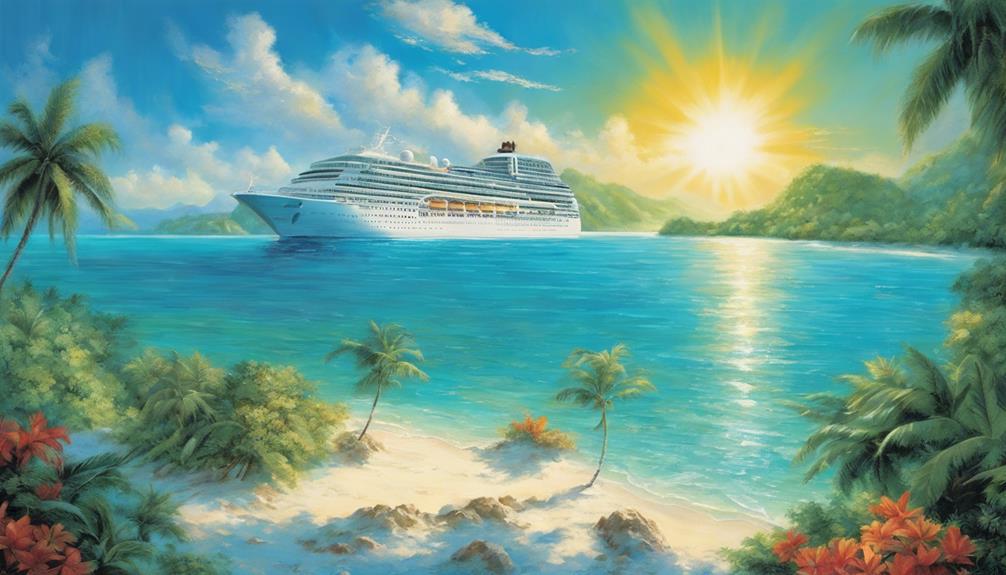
When it comes to choosing the best time to go on a cruise for perfect weather, it's like steering a maze of climate patterns to find that golden ticket. But fear not, as we have the compass to guide you in the right direction.
Understanding the seasonal nuances can make all the difference between a sun-kissed voyage and a rainy retreat. So, grab your sunscreen and pack your bags as we uncover the best times to set sail for idyllic weather conditions that will make your cruise a memorable experience.
Key Takeaways
- Caribbean cruises: December to mid-April for best weather conditions
- Alaskan cruises: Late June to mid-July for breathtaking landscapes
- Mediterranean cruises: April-May & September-October for ideal weather
- Hawaii cruises: Summer and fall months for dry weather and sunny skies
Ideal Months for Caribbean Cruises
For ideal weather conditions and a pleasant cruising experience in the Caribbean, consider booking your voyage between December and mid-April. During this period, the Caribbean boasts the best weather for cruises, with dry conditions and sunny skies prevailing. This stretch offers a fantastic opportunity to soak up the sun, enjoy water activities, and explore the stunning destinations in the region without the worry of rainstorms or excessive humidity.
Late summer into fall presents the cheapest time for Caribbean cruises, making it an excellent choice for budget-conscious travelers looking to experience the beauty of the Caribbean without breaking the bank. By opting for a cruise during this period, you can take advantage of lower prices and fewer crowds while still enjoying the warm waters and picturesque landscapes the Caribbean is known for.
Avoiding the peak season from December to April is advisable for those seeking a more peaceful and wallet-friendly experience. Sailing in late June through August allows travelers to steer clear of the crowds, particularly families on vacation during school breaks, making for a more relaxed and intimate cruise experience.
Optimal Weather for Alaskan Cruises
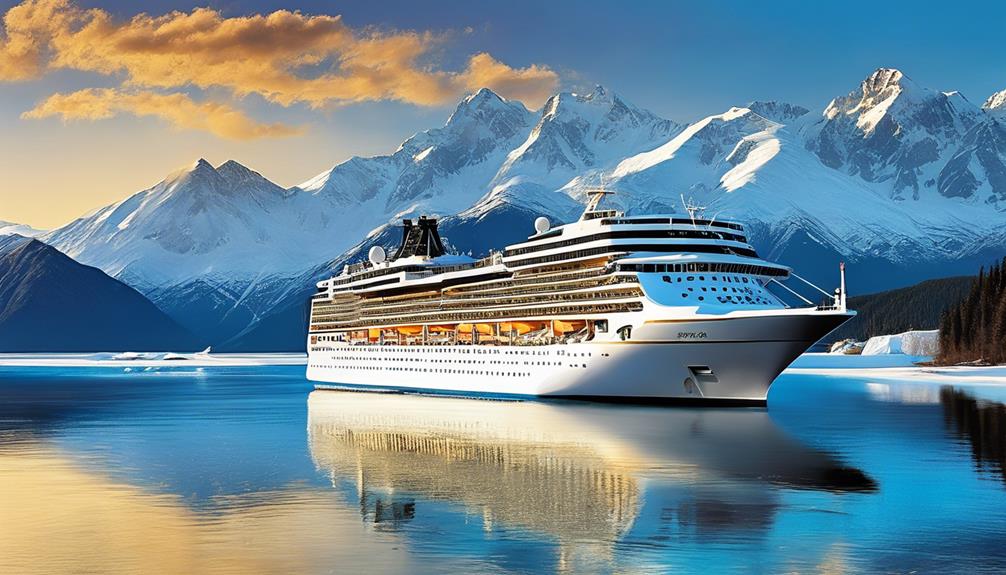
To maximize your Alaskan cruise experience, targeting late June through mid-July guarantees ideal weather conditions for enjoying the breathtaking landscapes and wildlife sightings in the region. During mid-July, you can witness the spectacular salmon run season, where various wildlife, including bears and bald eagles, gather along the rivers for this perfect phenomenon.
Late August to mid-September is another excellent window for Alaskan cruises, offering pleasant weather and often lower prices as it marks the end of the peak season. If your focus is on spotting whales, August is the prime time for your cruise, as these majestic creatures are commonly seen during this period.
For those seeking a balance between affordability and decent weather, mid-May to early June also presents a good opportunity to explore Alaska on a cruise. Keep these ideal weather periods in mind when planning your Alaskan adventure for an unforgettable experience.
Perfect Seasons for Mediterranean Cruises
April-May and September-October stand out as the prime seasons for Mediterranean cruises, offering ideal weather conditions and fewer crowds for a delightful experience exploring the region. During these shoulder seasons, the Mediterranean boasts milder temperatures and a more relaxed atmosphere compared to the peak tourist season in July and August. Traveling in April or May allows for pleasant sightseeing without the sweltering heat or overwhelming crowds. Likewise, September and October provide a serene setting for cruising with comfortable weather and less tourist congestion.
Additionally, prices for Mediterranean cruises tend to be lower from May to November, making it a cost-effective option for travelers seeking a budget-friendly voyage. Consider booking a Mediterranean cruise in May 2024 with MSC starting at $499/person to enjoy the perfect blend of favorable weather and affordable prices.
- Ideal weather conditions
- Fewer crowds
- Milder temperatures
- Lower prices during shoulder seasons
- Peak tourist season in July and August
Prime Time for Hawaii Cruises
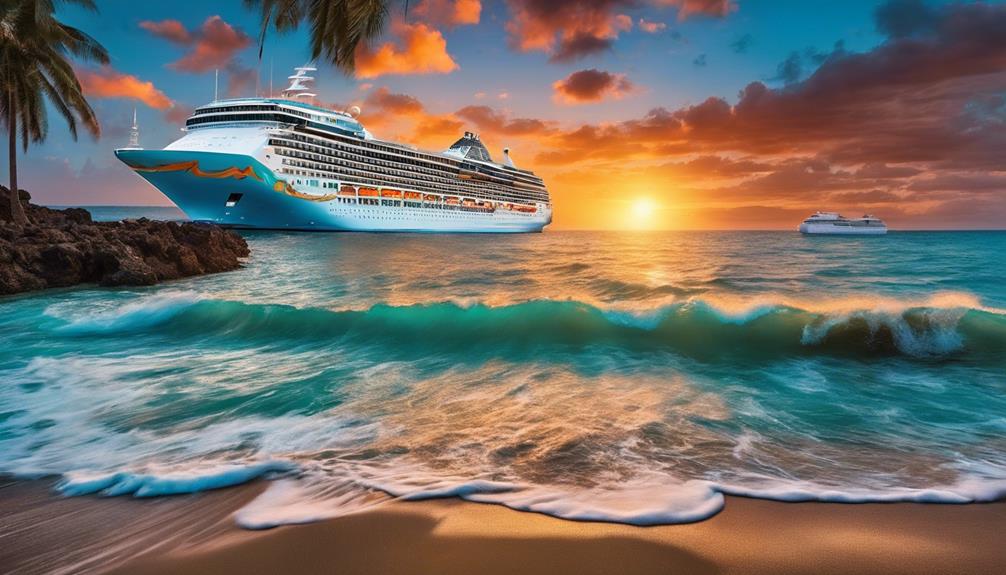
The best time to start on a Hawaii voyage is usually during the summer and fall months when the weather is dry and the skies are sunny. Hawaii cruises are particularly rewarding from mid-September through October, offering ideal conditions for a memorable experience. If you're interested in whale watching, the period from late October through May is perfect for spotting these majestic creatures in their natural habitat. During this time, the weather remains pleasant, with minimal rainfall from August through October, ensuring a smooth sailing experience.
For travelers seeking a cost-effective option, January through March can be a good time to contemplate a Hawaii cruise, although weather conditions may vary slightly. These months often offer competitive pricing and fewer crowds, allowing you to enjoy the beauty of Hawaii at a more relaxed pace. Whether you're into adventure, relaxation, or simply soaking in the stunning scenery, a Hawaii cruise during the summer and fall months promises an unforgettable journey.
Best Weather for Australia & New Zealand Cruises
For those considering voyages beyond Hawaii, exploring the best weather for Australia & New Zealand cruises becomes paramount, especially as these regions offer unique experiences throughout the year. When planning your cruise to Australia and New Zealand, keep in mind the following key points for an enjoyable voyage:
- November to March: This period offers warm temperatures and sunny weather in major ports like Sydney, making it the best time to go on a cruise in Australia & New Zealand.
- Early February to mid-March: Experience the warmest weather in Australia during these months, ensuring a comfortable cruise.
- New Zealand's Climate: With a temperate climate, layering is recommended for cruises throughout the year to stay comfortable.
- Consider Off-Peak Months: October, November, or April can provide discounted fares in Australia outside the peak season, allowing for savings on your cruise.
- Reversed Seasons: Australia and New Zealand have reversed seasons compared to the northern hemisphere, influencing the ideal timing for a cruise in these regions.
Planning your trip around these factors will help you make the most of your cruise experience in Australia and New Zealand.
Conclusion
To guarantee the best time to go on a cruise for perfect weather is essential for a memorable and enjoyable experience. By researching the ideal months for different regions like the Caribbean, Alaska, Mediterranean, Hawaii, Australia, and New Zealand, you can secure smooth sailing and sunny skies.
Don't just take our word for it, investigate the truth of this theory yourself and discover the magic of cruising in ideal weather conditions.
- About the Author
- Latest Posts
Introducing Ron, the home decor aficionado at ByRetreat, whose passion for creating beautiful and inviting spaces is at the heart of his work. With his deep knowledge of home decor and his innate sense of style, Ron brings a wealth of expertise and a keen eye for detail to the ByRetreat team.
Ron’s love for home decor goes beyond aesthetics; he understands that our surroundings play a significant role in our overall well-being and productivity. With this in mind, Ron is dedicated to transforming remote workspaces into havens of comfort, functionality, and beauty.
Beginners Guides
The Best Time to Cruise for Budget-Friendly Deals
Fulfill your wanderlust dreams without draining your wallet by learning the key to scoring budget-friendly cruise deals.
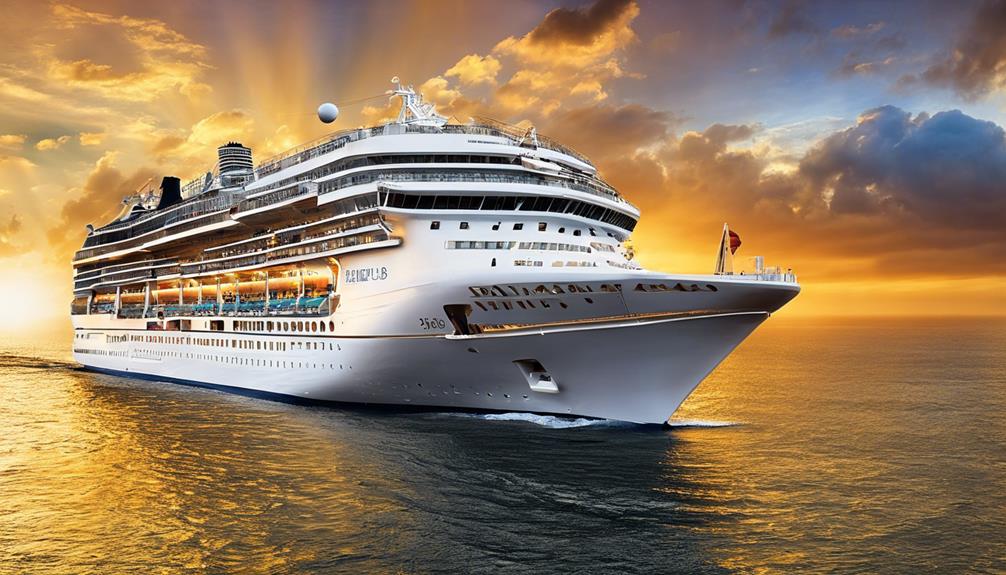
When it comes to finding budget-friendly cruise deals, timing is key. Imagine setting sail on the crystal blue waters of the Caribbean or exploring the stunning glaciers of Alaska without breaking the bank.
There's a specific window of opportunity that savvy cruisers keep an eye on to secure the best rates and save some serious cash. But how do you know when to book your next adventure to make the most of your budget?
Let's uncover the secrets behind scoring the ultimate cruise deals and making your dream vacation a reality.
Key Takeaways
- Booking during wave season in January to March ensures budget-friendly deals.
- Monitoring prices post-booking for drops leads to potential refunds or upgrades.
- Repositioning cruises in spring and fall offer cost-effective options.
- Leveraging loyalty programs maximizes savings for affordable cruising.
Ideal Seasons for Budget-Friendly Cruises
When seeking budget-friendly cruise deals, timing plays an important role in securing the best value for your money. Shoulder seasons such as September, October, and early December present excellent opportunities for travelers looking for cheaper fares. These off-peak times often offer discounted rates and fewer crowds, making it an ideal choice for budget-conscious individuals.
Additionally, booking during wave season in January and February can lead to significant discounts and promotions, maximizing savings on your cruise vacation.
Repositioning cruises during spring and fall are another fantastic option for savvy travelers seeking affordable deals. These cruises often provide cost-effective choices as cruise lines move their ships between different regions.
Avoiding major holidays and school breaks is also key to securing cheaper cruise fares and ensuring a more relaxed cruising experience. Moreover, sailing from Florida during off-peak times can offer a wide range of options and better deals for those looking to save on their cruise adventures.
Strategies for Booking Affordable Cruises
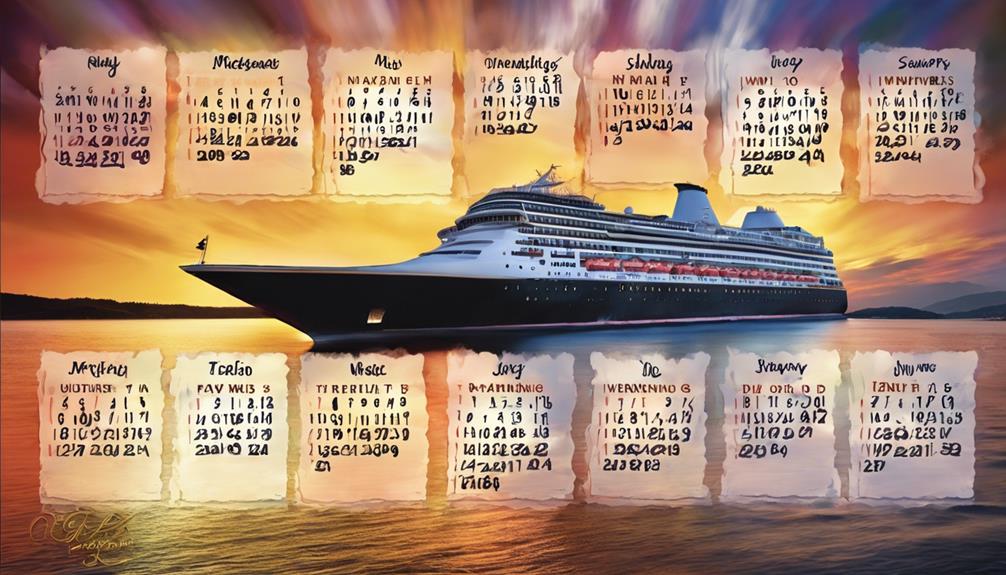
To secure the best deals on cruises, it's important to employ strategic booking approaches that maximize cost savings and value for your vacation. When aiming for budget-friendly cruise deals, consider the following strategies:
- Booking in Advance: Securing your cruise early, especially during wave season from January to March, can lead to lower rates and additional benefits.
- Monitoring Fare Changes: Keep an eye on fluctuating fares and be ready to book when prices drop to secure the best deal.
- Being Flexible with Travel Dates: Flexibility can be key in finding affordable cruise options, as adjusting your travel dates slightly can result in significant savings.
- Considering Repositioning Cruises: Exploring repositioning cruises or sailing during shoulder seasons can offer unique routes and discounted prices.
- Utilizing Loyalty Programs and Off-Peak Times: Take advantage of loyalty programs, monitor price drops, and consider traveling during off-peak times to maximize your savings on cruise vacations.
Best Times to Score Cruise Deals
During wave season from January to March, travelers can capitalize on the best times to secure budget-friendly cruise deals. Booking well in advance is key to snagging the most favorable timing and rates for your cruise.
Additionally, considering repositioning cruises during the spring and fall can offer discounted prices, making them a great option for those seeking budget-friendly deals. It's also advisable to keep an eye out for price drops even after booking, as this could potentially lead to refunds or upgrades for your cruise experience.
Leveraging loyalty programs or memberships can grant you access to exclusive discounts and savings on your upcoming cruise. By being proactive and strategic in your approach to booking and monitoring deals, you can maximize your chances of finding the best cruise deals that align with your budget and preferences.
Timing Tips for Budget-Friendly Cruises
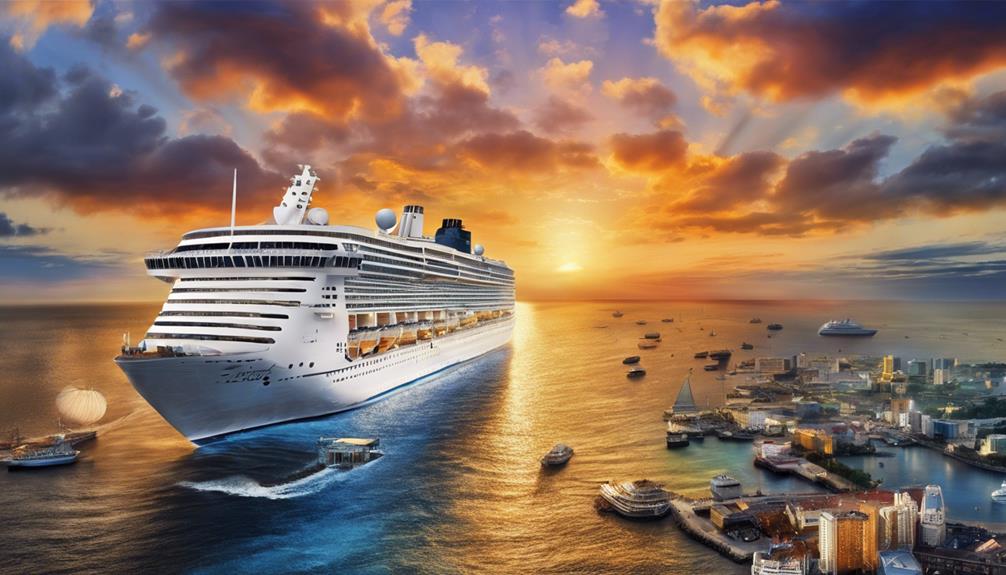
Let's explore practical strategies for maximizing your savings on budget-friendly cruises through strategic timing tips. When aiming to secure the best cruise deals that align with your budget, consider the following insights:
- Booking in Advance: Take advantage of wave season from January to March to lock in lower rates and secure desirable cabin options.
- Monitoring Prices: Keep an eye on price drops even after booking to potentially benefit from refunds or upgrades, enhancing your overall cruise experience.
- Loyalty Programs: Utilize loyalty programs or memberships to access additional discounts and exclusive perks, making your budget-friendly cruise even more cost-effective.
- Nearby Ports: Opt for cruises departing from nearby ports to save on airfare costs, enabling you to allocate more of your budget towards onboard activities and excursions.
- Discounts Galore: Embrace the array of discounts available during wave season and beyond, ensuring that you snag the best possible deal for your budget-friendly cruise adventure.
When to Book for Cruise Savings
Securing cruise savings hinges on strategic timing and proactive booking practices. To find the best deals, consider booking during wave season from January to March when many cruise lines offer enticing discounts.
Booking early not only guarantees better rates but also provides a wider selection of cabin choices. Keep an eye out for fare changes even after booking, as price drops may occur, presenting an opportunity for additional savings.
While waiting for last-minute deals can sometimes lead to the cheapest rates, this approach often comes with limited cabin availability. To stay informed about price fluctuations, utilize tools like the Shipmate app and Cruise Critic for efficient monitoring.
Conclusion
To summarize, cruising during the off-peak season can help us save some serious dough. Booking early during wave season is key to scoring those sweet deals.
So, let's set sail and make some memories without breaking the bank. Remember, early bird gets the worm – or should I say, the cruise discount!
- About the Author
- Latest Posts
Introducing Ron, the home decor aficionado at ByRetreat, whose passion for creating beautiful and inviting spaces is at the heart of his work. With his deep knowledge of home decor and his innate sense of style, Ron brings a wealth of expertise and a keen eye for detail to the ByRetreat team.
Ron’s love for home decor goes beyond aesthetics; he understands that our surroundings play a significant role in our overall well-being and productivity. With this in mind, Ron is dedicated to transforming remote workspaces into havens of comfort, functionality, and beauty.
-

 Decor1 week ago
Decor1 week agoMaximalist Decor Explained: Embrace More Style
-

 Vetted4 weeks ago
Vetted4 weeks ago15 Best Drip Irrigation Systems to Keep Your Garden Thriving
-

 Vetted2 weeks ago
Vetted2 weeks ago15 Best Foot Massagers for Neuropathy to Soothe Your Feet and Relieve Discomfort
-

 Vetted3 weeks ago
Vetted3 weeks ago15 Best Sports Laundry Detergents for Keeping Your Activewear Fresh and Clean
-

 Vetted3 weeks ago
Vetted3 weeks ago15 Best Tall Toilets for Seniors That Combine Comfort and Safety
-

 Vetted4 weeks ago
Vetted4 weeks ago15 Best Dish Scrubbers to Keep Your Kitchen Sparkling Clean
-

 Decor4 weeks ago
Decor4 weeks agoWhat Is Eclectic Home Decor
-

 Vetted5 days ago
Vetted5 days ago15 Best Organic Pest Control Solutions for a Naturally Pest-Free Home


















